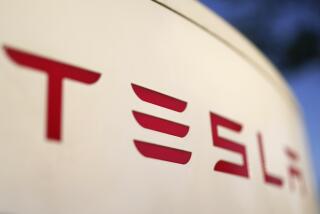Toyota and Justice Department said to reach $1.2 billion settlement in criminal case

Toyota has agreed to pay a $1.2-billion fine in a settlement with the U.S. government, ending a four-year federal criminal investigation.
Toyota Motor Co. and the Justice Department have agreed on a $1.2-billion settlement to close a criminal probe into whether the automaker handled cases of sudden acceleration properly, according to media reports.
The settlement -- which could be announced as early as Wednesday -- would end a four-year federal criminal investigation into sudden acceleration complaints dating back to 2009. The issue forced Toyota to recall millions of vehicles and pay out tens of millions of dollars in fines and civil settlements. Hundreds of civil lawsuits remain unresolved.
“While the $1-billion price tag represents a costly resolution, Toyota can put this issue behind it to fully focus on current and future challenges in a highly competitive market,” said Karl Brauer, senior analyst at Kelley Blue Book.
The potential settlement could allow Toyota to avoid criminal charges provided it meets conditions imposed by the court. An independent monitor will be appointed to make sure Toyota complies with the agreement. The potential settlement was first reported by the Wall Street Journal, citing anonymous sources.
Toyota still faces a Securities and Exchange Commission investigation, according to a regulatory filing the automaker made last year.
The automaker’s sudden acceleration issue first came to light in 2009 when an off-duty California Highway Patrol officer and his family were killed in a crash believed to have been caused by the gas pedal getting stuck under their car’s floor mat.
The officer’s desperate 911 call prior to the crash was made public, and in it he can be heard pleading for advice on how to get the car to stop. The car hit speeds of up to 120 mph before flying off the road and bursting into flames. Everyone inside was killed instantly.
In the weeks and months after news of the crash was made public, Toyota recalled more than 10 million vehicles globally, and several congressional committees called in key executives from Japan to testify.
The automaker has long denied that any sort of electronic malfunction caused any of the crashes. Instead, Toyota has pointed to driver error, the gas pedal getting stuck under floor mats, or sticky gas pedals.
A 10-month investigation by NASA engineers found no evidence of electronic errors or software glitches as the cause of thousands of sudden acceleration incidents reported over the last decade.
Yet last year, a jury in Oklahoma disagreed, finding that a crash involving a Toyota Camry that killed one woman and injured another, was indeed caused by faulty electronic systems. The jury awarded the plaintiffs $3 million.
The automaker has also had to pay $25.5 million to settle shareholder claims that Toyota’s failure to report safety issues damaged its stock value. The company has paid another $65 million in fines for violating federal vehicle safety laws.
During the Justice Department’s investigation into the sudden acceleration cases, the agency found that Toyota had made “misleading statements” about safety problems that were revealed by the automaker’s own internal audits, the Journal reported, citing a government official with knowledge of the investigation.
Toyota also gave misleading information to the public and the U.S. government about those safety problems, the source disclosed.
The news of the potential settlement comes as rival automaker General Motors is mired in a Justice Department investigation into whether executives at the company knew about a flaw with the ignition switch on 1.6 million vehicles, yet failed to issue a recall. At least 12 deaths and 31 accidents have been caused by GM’s oversight, and committees in both the U.S. House of Representatives and Senate have also opened investigations.
“The timing of this settlement is interesting because it means the government will be finalizing the last major automotive recall, Toyota’s unintended acceleration, just as it gears up for the next big recall related to GM’s ignition switch,” Brauer said. “The cases are similar because they both involve a long, established history of vehicle incidents that took years to identify and address.”







